What to Know
Are you a poodle owner struggling with your furry friend’s biting and chewing habits? Poodle biting and chewing can be frustrating and even dangerous, especially when it comes to children or other pets. Luckily, there are many ways to prevent and control this behavior in your poodle.
Understanding poodle biting and chewing is the first step in addressing the issue. Poodles are known for their high energy and playful nature, which can lead to biting and chewing as a form of play or exploration. However, biting and chewing can also be a sign of anxiety, boredom, or even aggression. By understanding the reasons behind your poodle’s behavior, you can better address the issue and find effective solutions.
If you’re struggling with poodle biting and chewing, don’t worry! With the right tools and techniques, you can prevent and control this behavior in your furry friend. From teaching bite inhibition to providing chew toys and distractions, there are many ways to address poodle biting and chewing. Keep reading to learn more about preventing and controlling poodle biting and chewing.
Key Takeaways
- Understanding the reasons behind poodle biting and chewing is the first step in addressing the issue.
- There are many ways to prevent and control poodle biting and chewing, including teaching bite inhibition and providing chew toys and distractions.
- With the right tools and techniques, you can effectively address poodle biting and chewing and enjoy a happy, healthy relationship with your furry friend.
Understanding Poodle Biting and Chewing
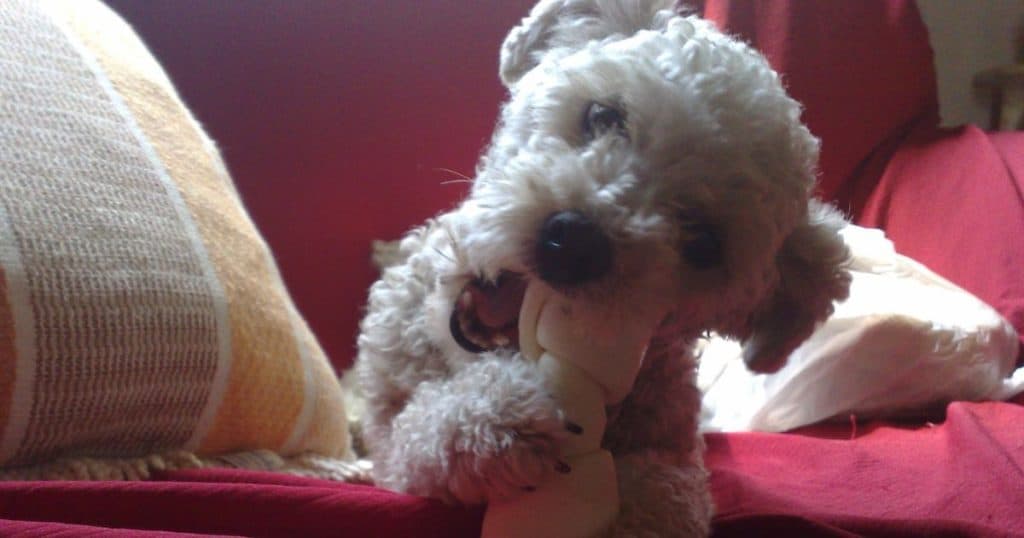
As a poodle owner, you may be familiar with your furry friend’s biting and chewing habits. Poodle biting and chewing can be a natural behavior, especially in puppies, as they explore their world and develop their teeth. However, adult poodles can also exhibit biting and chewing behaviors, which may be due to various reasons like anxiety, boredom, or lack of exercise.
Poodles are known for their playful mouthing, which is a natural behavior that puppies use to interact with their littermates and explore their environment. However, playful mouthing can turn into biting if not corrected early on. Training your poodle not to bite can be a challenging task, but with patience and consistent training, you can teach your poodle to stop biting.
Chewing is also a common behavior in poodles, especially in puppies. Puppies chew to relieve the pain of teething and to explore their environment. However, adult poodles can also chew due to boredom, anxiety, or lack of exercise. Chewing can be destructive, especially when your poodle chews on furniture or other valuable items.
To prevent your poodle from chewing on inappropriate items, provide them with appropriate chew toys. You can also train your poodle to stop chewing on furniture by using positive reinforcement techniques. Consistent training and providing your poodle with enough exercise and mental stimulation can also help reduce their chewing behavior.
In conclusion, understanding your poodle’s biting and chewing behavior is essential to prevent destructive behavior and promote a healthy relationship between you and your furry friend. With patience, consistent training, and providing your poodle with enough exercise and mental stimulation, you can help your poodle overcome their biting and chewing habits.
Causes of Poodle Biting and Chewing

As a Poodle owner, you may have noticed your furry friend engaging in biting and chewing behaviors. There are several reasons why Poodles may bite and chew, including pain, teething, sore gums, allergies, fleas, itching, dry skin, mites, parasites, ticks, arthritis, stress, boredom, tiredness, and anxiety.
One of the most common reasons why Poodles bite and chew is teething. Just like human babies, puppies go through a teething phase, which can be frustrating and overwhelming for them. During this time, puppies will chew on anything they can get their teeth on, including your hands, furniture, and shoes.
Another reason why Poodles may bite and chew is due to pain or discomfort. If your Poodle is experiencing pain or discomfort, they may resort to biting and chewing as a way to alleviate their discomfort. For instance, if your Poodle has sore gums, they may bite and chew on objects to relieve the pain.
Allergies, fleas, itching, dry skin, mites, parasites, and ticks are other common causes of Poodle biting and chewing. If your Poodle is experiencing any of these issues, they may bite and chew on their skin or fur to relieve the itching or discomfort.
Stress, boredom, tiredness, and anxiety are also common causes of Poodle biting and chewing. If your Poodle is feeling stressed, bored, or anxious, they may resort to biting and chewing as a way to relieve their stress or anxiety.
In conclusion, Poodle biting and chewing can be caused by a variety of factors, including teething, pain, allergies, fleas, itching, dry skin, mites, parasites, ticks, arthritis, stress, boredom, tiredness, and anxiety. As a responsible Poodle owner, it’s essential to identify the underlying cause of your Poodle’s biting and chewing behavior and take appropriate steps to address it.
Puppy Biting vs. Adult Biting
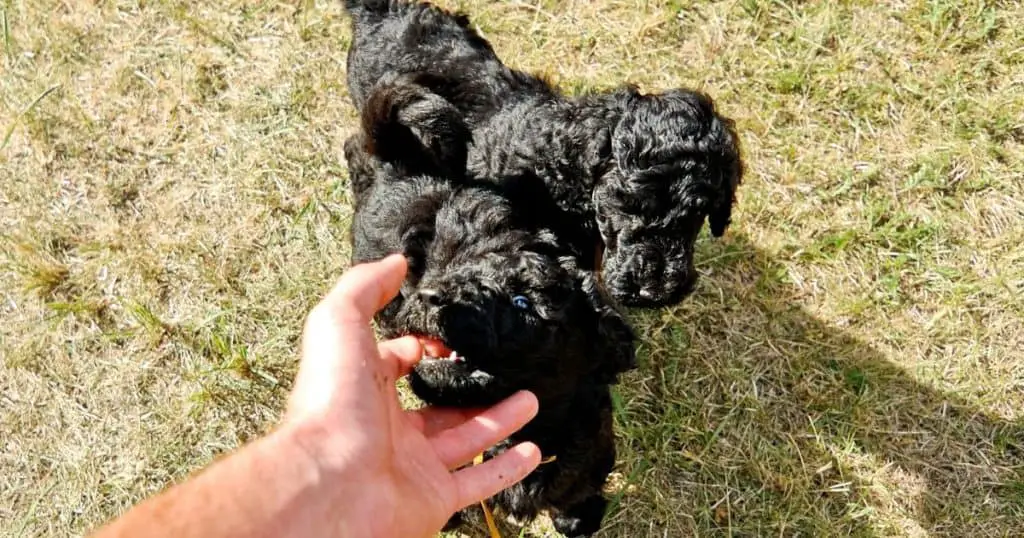
Understanding the difference between puppy biting and adult biting is crucial in preventing unwanted behavior in your poodle. Puppies explore the world with their mouths, which means they will often bite and chew on anything they can get their teeth on, including your hands, feet, and clothing. This behavior is entirely normal and is a part of their teething process, which can last up to six months.
However, adult biting is a different story. Adult biting can be a sign of aggression, fear, or a lack of socialization. If your poodle is biting as an adult, it is essential to understand the underlying cause and address it promptly.
One way to prevent adult biting is by teaching your puppy bite inhibition. Bite inhibition is the ability to control the force of a bite and is crucial in preventing aggressive biting behavior as an adult. Teaching bite inhibition involves allowing your puppy to mouth and bite during play, but when they bite too hard, you should yelp or say “ouch” and stop playing for a few seconds. This teaches your puppy that biting too hard results in the end of playtime.
Social practice is also essential in preventing adult biting behavior. Socialization involves exposing your puppy to different people, animals, and environments to help them become well-adjusted and comfortable in various situations. Lack of socialization can lead to fear and aggression, which can result in biting behavior.
In summary, understanding the difference between puppy biting and adult biting is crucial in preventing unwanted behavior in your poodle. Teaching bite inhibition and socializing your puppy can help prevent aggressive biting behavior as an adult. If your poodle is biting as an adult, it is essential to understand the underlying cause and address it promptly.
Preventing and Controlling Biting
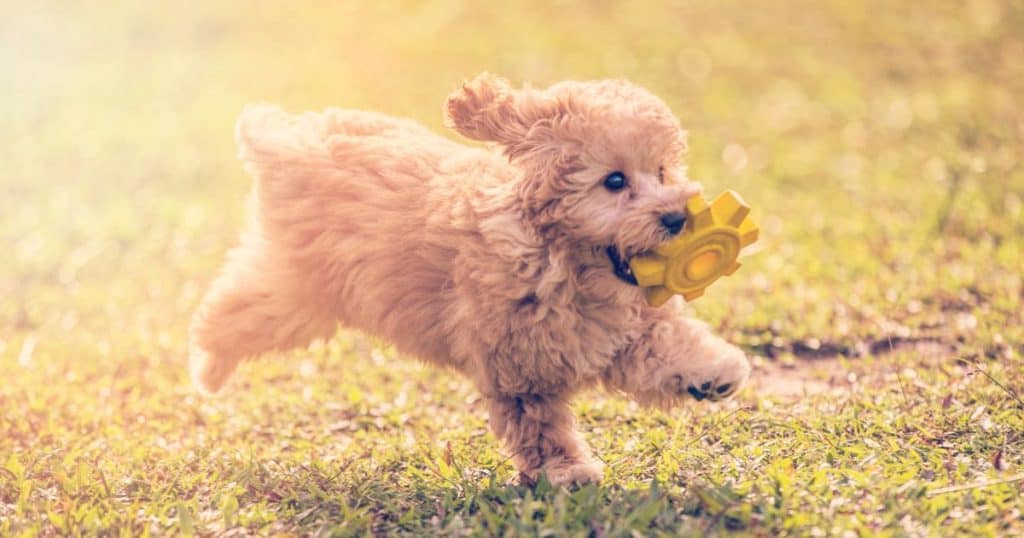
Poodle biting can be a frustrating issue for many pet owners. However, it is essential to understand that biting is a natural behavior for dogs, and it is their way of exploring the world around them. Poodle puppies, especially, tend to bite a lot as they are teething and exploring their environment. As a responsible pet owner, it is your responsibility to train your poodle to control their biting behavior.
One effective way to prevent biting is to provide your poodle with plenty of toys to chew on. Chew toys are a great way to satisfy your poodle’s need to chew and bite, and it can also help prevent them from biting you or others. Make sure to invest in high-quality chew toys that are safe for your poodle to use.
Another way to prevent biting is to redirect your poodle’s biting behavior. Whenever your poodle starts to bite you or others, redirect their attention to a toy or a bone that they can chew on. This can help them learn that biting humans is not acceptable behavior.
Consistency is key when it comes to preventing biting behavior in your poodle. Make sure to enforce rules and boundaries consistently, and avoid any actions that might encourage your poodle to bite, such as playing rough or wrestling with them.
In addition to providing your poodle with plenty of exercise and playtime, it is also important to engage in behavioral and brain training for dogs. This can help your poodle learn to control their impulses and develop good habits that can prevent biting behavior.
It is also important to keep your poodle calm and avoid situations that might cause them to become anxious or stressed. If your poodle tends to bite when they are anxious or stressed, try to identify the triggers and avoid them whenever possible.
Finally, if your poodle continues to bite despite your efforts to prevent it, consider using a crate or a playpen to keep them contained when you are not able to supervise them. This can help prevent them from biting and also keep them safe and secure.
In summary, preventing and controlling biting behavior in your poodle requires a combination of training, consistency, and patience. By providing your poodle with plenty of toys to chew on, redirecting their biting behavior, engaging in behavioral and brain training, and avoiding situations that might cause them to become anxious or stressed, you can help prevent biting behavior and ensure that your poodle is a happy and well-behaved member of your family.
Professional Help and Training
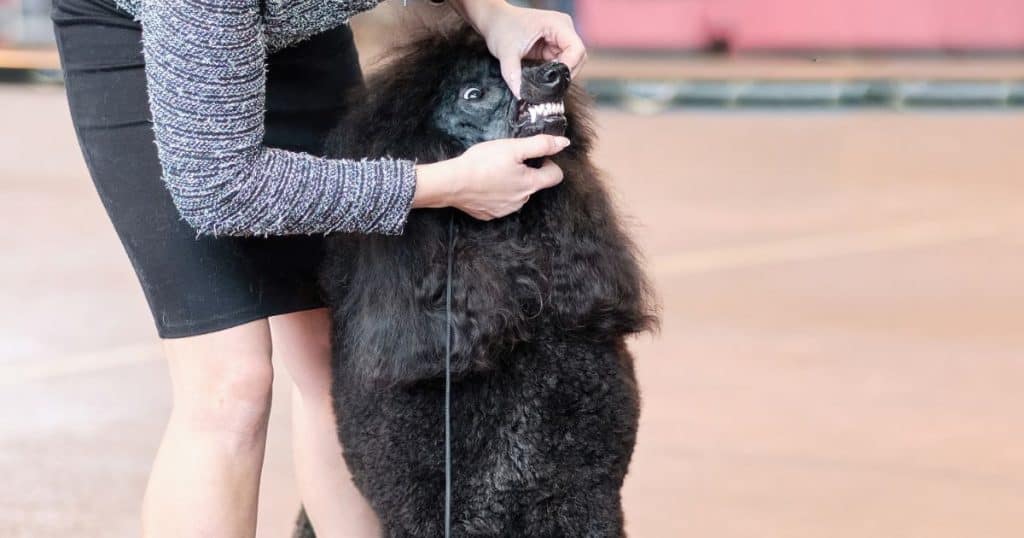
If your Poodle’s biting and chewing behavior persists, it may be time to seek professional help. A veterinarian can rule out any underlying medical conditions that may be causing the behavior. A certified applied animal behaviorist or certified professional dog trainer can provide behavior help and training to address the issue.
A professional dog trainer can help you teach your Poodle bite inhibition and other basic obedience skills. They can also offer alternative methods to redirect your dog’s biting and chewing behavior. Puppy classes are also a great option for socialization and training.
A certified applied animal behaviorist can provide more specialized behavior help for your Poodle’s biting and chewing behavior. They can develop a training plan tailored to your Poodle’s specific needs and work with you to implement it. They can also provide guidance on managing your Poodle’s environment to prevent unwanted behavior.
It’s important to choose a reputable and experienced professional to work with your Poodle. Ask for recommendations from friends, family, or your veterinarian. You can also check with organizations such as the American Kennel Club or the International Association of Animal Behavior Consultants for certified professionals in your area.
Remember, professional help and training may take time and patience. Consistency and positive reinforcement are key to addressing your Poodle’s biting and chewing behavior. With the right guidance and training, your Poodle can learn to curb their biting and chewing habits and become a well-behaved companion.
Toys and Distractions
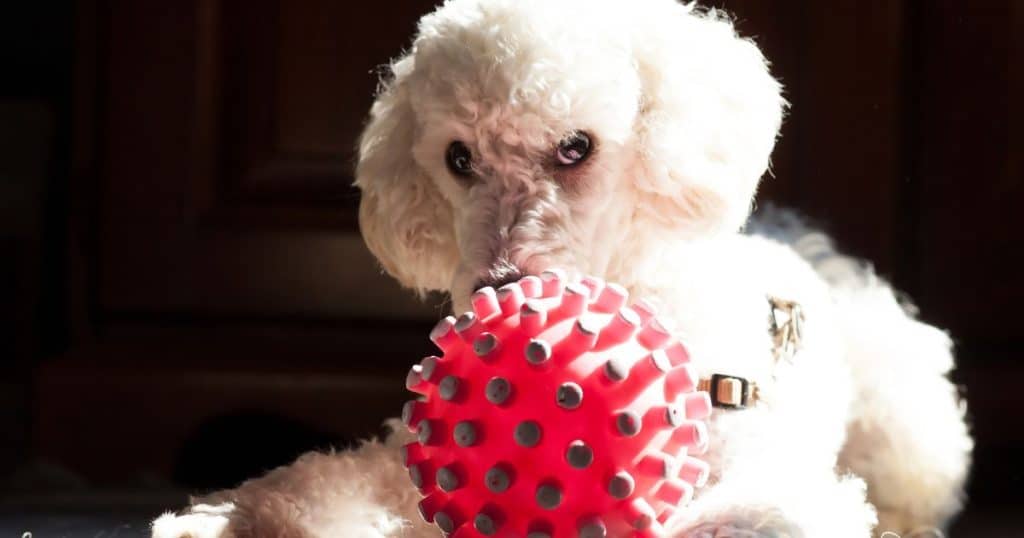
When your Poodle starts to bite and chew on everything in sight, it can be frustrating and overwhelming. One of the most effective ways to redirect their attention is by providing them with toys and distractions that are safe and appropriate for their age and size.
Chew toys are an excellent option for Poodles who love to chew. These toys are designed to withstand heavy chewing and can help clean your Poodle’s teeth and gums. Some popular chew toys include the KONG Classic Dog Toy and the Nylabone Dura Chew Textured Ring.
Fetch and tug-of-war toys are perfect for Poodles who love to play. These toys are great for interactive playtime and can help burn off excess energy. Some popular fetch and tug-of-war toys include the Chuckit! Ultra Ball and the KONG Tug Toy.
When choosing toys for your Poodle, it is essential to invest in high-quality toys that are safe and durable. Avoid toys that are too small or too big for your Poodle, as they can pose a choking hazard. Additionally, toys that are too soft or flimsy can be easily destroyed, which can be dangerous for your Poodle.
If your Poodle is investigating and wrestling with objects they shouldn’t, it’s important to redirect their attention to an appropriate toy or distraction. Providing your Poodle with a chew toy or other distractions can help divert their attention from biting and chewing on inappropriate objects.
In conclusion, providing your Poodle with appropriate toys and distractions is an effective way to redirect their attention from biting and chewing on inappropriate objects. Invest in high-quality toys that are safe and durable, and avoid toys that are too small or too big for your Poodle. With the right toys and distractions, you can help your Poodle develop healthy chewing habits and prevent damage to your home and belongings.
Correcting Biting Behavior
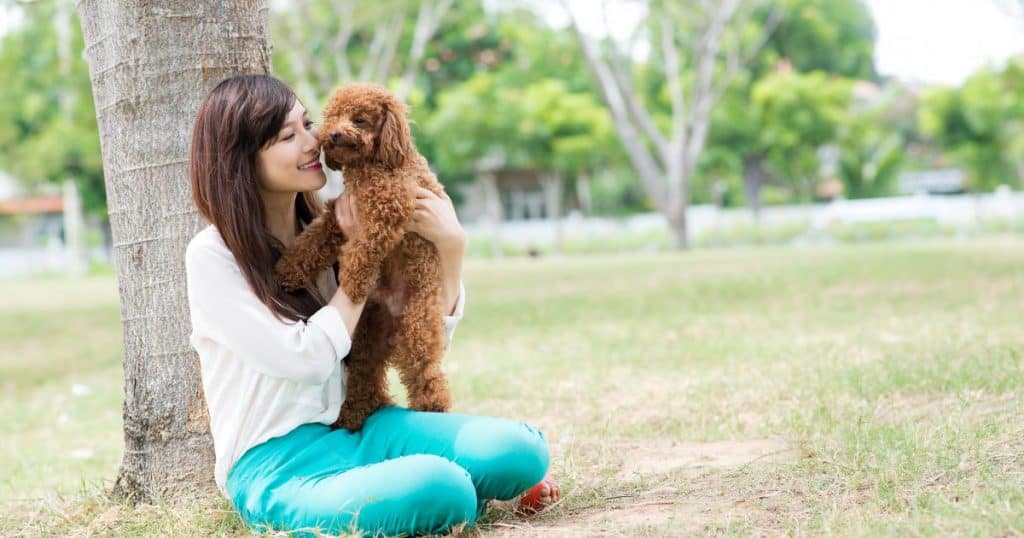
If your poodle is biting or nipping, it’s essential to correct the behavior immediately. Correcting biting behavior requires patience, consistency, and positive reinforcement. Using force, painful punishment or physical punishment will only make the situation worse and can lead to aggressive behavior in the future.
One effective way to correct biting behavior is to teach bite inhibition. This process involves teaching your poodle to control the force of their bite and eventually stop biting altogether. You can start by yelping or saying “ouch” when your poodle bites too hard. This will signal to your poodle that they have caused pain and need to be gentler.
Another way to correct biting behavior is to implement consequences. When your poodle bites, you can give a verbal correction, such as saying “no” or “stop.” You can also use a time-out by removing your poodle from the situation or putting them in a designated area, such as a crate or playpen. This will give them time to calm down and prevent them from biting.
Investing in chew toys is another helpful tip for preventing your poodle from biting. Providing them with plenty of toys to chew on will help satisfy their need to chew and bite while keeping their teeth healthy.
It’s also important to socialize your poodle and provide positive reinforcement for good behavior. Encourage noncontact forms of play, such as fetch or tug-of-war, and reward your poodle with treats and praise when they exhibit good behavior during interactions with people or other dogs.
If your poodle’s biting behavior persists, it’s essential to consult with a veterinarian or professional dog trainer. They can provide additional guidance and support to help correct the behavior and ensure the safety of your poodle and others.
Health Checks and Regular Care
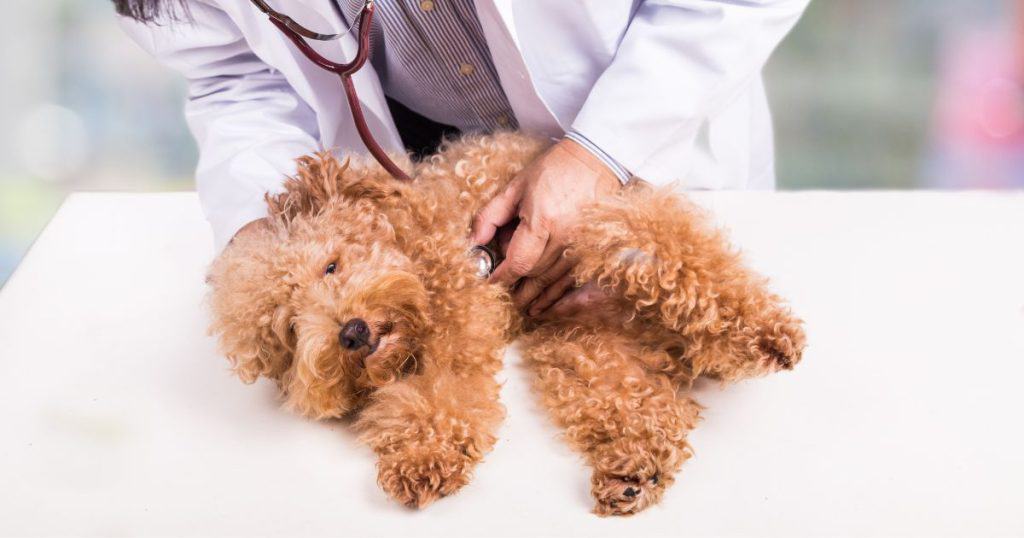
As a responsible pet parent, it is important to schedule regular check-ups with your veterinarian to ensure that your Poodle is healthy and happy. During these visits, your vet will examine your dog’s teeth, gums, and overall oral health to ensure that everything is in good condition. This is especially important when it comes to Poodle biting and chewing behavior, as dental problems can often lead to excessive biting and chewing.
In addition to regular check-ups, there are a few things you can do at home to help keep your Poodle’s teeth and gums healthy. First, make sure to brush your dog’s teeth regularly using a soft-bristled toothbrush and dog-specific toothpaste. This will help remove any plaque or tartar buildup and reduce the risk of dental disease.
Another important aspect of Poodle care is providing plenty of opportunities for play and exercise. Poodles are active dogs that require regular exercise and stimulation to keep them healthy and happy. This can include activities like playing fetch, going for walks, or even participating in agility training.
When it comes to Poodle biting and chewing behavior, it is important to provide your dog with plenty of appropriate chew toys and bones to help satisfy their natural urge to chew. This can help prevent destructive chewing behavior and keep your dog’s teeth and gums healthy.
If your Poodle exhibits excessive biting or chewing behavior, it may be helpful to enroll them in a training program or work with a professional dog trainer to help address these issues. This can include teaching your dog appropriate play behavior, using a time-out procedure to discourage annoying behavior, and yelping or using a time-out procedure to discourage rough play.
Overall, taking care of your Poodle’s health and providing plenty of opportunities for play and exercise are key to preventing excessive biting and chewing behavior. By working with your veterinarian and providing your dog with plenty of appropriate chew toys and bones, you can help keep your Poodle healthy, happy, and well-behaved.
FAQs
What should Poodles avoid eating?
Poodles should avoid eating chocolate, caffeine, alcohol, grapes, raisins, onions, garlic, avocado, nuts, and fatty foods. These foods can cause serious health problems in Poodles, including vomiting, diarrhea, seizures, and even death. It’s important to keep these foods out of reach of your Poodle and to provide them with a balanced diet that meets their nutritional needs.
What are the best toys for Poodles?
The best toys for Poodles are those that are durable, safe, and stimulating. Toys that can be filled with treats or that make noise are great for keeping Poodles entertained and engaged. Some popular toys for Poodles include KONGs, puzzle toys, and squeaky toys. It’s important to supervise your Poodle while they play with toys to ensure that they don’t chew off and swallow any small pieces.
How to deal with toy Poodle growling and biting?
Toy Poodles may growl and bite due to fear, aggression, or anxiety. It’s important to address this behavior early on to prevent it from becoming a habit. One effective way to deal with growling and biting is to redirect your Poodle’s attention to a toy or treat. You can also teach your Poodle basic obedience commands such as “sit,” “stay,” and “come” to help them feel more secure and confident.
What are some common behavior problems in toy Poodles?
Some common behavior problems in toy Poodles include biting, chewing, barking, and jumping. These behaviors can be addressed through proper training and socialization. It’s important to establish clear rules and boundaries for your Poodle and to reinforce positive behavior with treats and praise.
What are the symptoms of teething in toy Poodles?
The symptoms of teething in toy Poodles include drooling, chewing, and biting. Teething can be uncomfortable for Poodles, so it’s important to provide them with appropriate chew toys and to monitor their chewing behavior to ensure that they don’t chew on anything dangerous or harmful.
How to discipline a Poodle effectively?
Effective discipline for Poodles involves positive reinforcement and consistency. It’s important to reward good behavior with treats and praise and to redirect negative behavior to more appropriate activities. Physical punishment should be avoided as it can damage the trust and bond between you and your Poodle.
Remember that each Poodle is unique, and what works for one may not work for another. It’s important to be patient and consistent in your training and to seek professional help if necessary.

